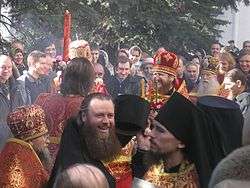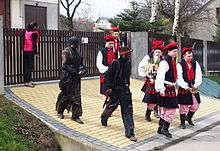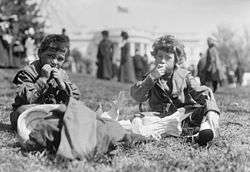Easter Monday
Easter Monday is the day after Easter Sunday and is a holiday in some countries. Easter Monday in the Western Christian liturgical calendar is the second day of Eastertide and analogously in the Byzantine Rite is the second day of Bright Week.
| Easter Monday | |
|---|---|
| Observed by | Christendom |
| Type | Christian |
| Observances | church services |
| Date | Day after Easter Sunday |
| 2019 date |
|
| 2020 date |
|
| 2021 date |
|
| 2022 date |
|
| Part of a series on |
| Christianity |
|---|
 |
|
|
|
|
|
.jpg)
Religious observances
Eastern Christianity

In the Eastern Orthodox Church and Byzantine Rite Catholic Churches, this day is called "Bright Monday" or "Renewal Monday". The services, as in the rest of Bright Week, are quite different from during the rest of the year and are similar to the services on Pascha (Easter Sunday) and include an outdoor procession after the Divine Liturgy; while this is prescribed for all days of that week, often they are only celebrated on Monday and maybe a couple of other days in parish churches, especially in non-Orthodox countries. Also, when the calendar date of the feast day of a major saint, e.g., St. George or the patron saint of a church or one's name day, falls during Holy Week or on Easter Sunday, the saint's day is celebrated on Easter Monday.[1][2]
National observances
Australia
In Australia, Easter Monday is a public holiday.[3] Some people enjoy outdoor sporting events, such as the Oakbank Easter Racing Carnival in South Australia,[4] and the Stawell Gift in Victoria, [5] as well as a traditoinal AFL match between Geelong Cats and the Hawthorn Hawks at the MCG. The Australian Three Peaks Race in Tasmania until 2011.[6]
Austria
In Austria and Southern Germany, there is the traditional "Emmausgang", commemorating the walk of the disciples to Emmaus, to which Jesus followed them without being recognized.
Canada
Easter Monday is the Monday immediately following Easter Sunday and is a statutory holiday for federal employees. Although not mandatory by federal regulation, some employers also give this day off to employees out of common practice. Additionally, this holiday succeeds Good Friday (the Friday preceding Easter), which is a mandatory holiday for all employees, giving those workers an extra long weekend in April. In provinces where Family Day, Islander Day, or Louis Riel Day are not observed, Easter Weekend is the first provincial holiday after New Year's Day.
Central Europe

Śmigus-dyngus (or lany poniedziałek, Polish for Wet Monday) is the name for Easter Monday in Poland and the diaspora. In the Czech Republic it is called velikonoční pondělí, in Slovakia veľkonočný pondelok and in Hungary Vízbevető. All these Catholic countries (and some others) practice the unique ancient custom on this day.[7] Traditionally, boys and men pour a bucket of water or perfume on girls and women and/or spank their buttocks and legs with long thin twigs (pussy willow) or switches made from willow, birch or decorated tree branches. A legend says that it keep women healthy, beautiful, and fertile during the whole next year.
Another related custom, unique to Poland, is that of sprinkling bowls (garce) of ashes on people or houses, celebrated a few weeks earlier at the "półpoście". This custom is almost forgotten, but still practiced in the area around the borders of Masuria and Masovia.
Egypt
In Egypt, the ancient festival of Sham El Nessim (Arabic: شم النسيم, literally meaning "smelling of the breeze") is celebrated on the Coptic (i.e. Eastern) Easter Monday, though the festival dates back to Pharonic times (about 2700 BC). It is an Egyptian national holiday. Traditional activities include painting eggs, taking meals outdoors, and eating feseekh (fermented mullet).
Germany
In Germany, people go out into the fields early in the morning and hold Easter egg races.[8] For Roman Catholics, Easter Monday is also a Holy Day of Obligation in Germany.[9]
Ireland
In the Republic of Ireland it is a day of remembrance for the men and women who died in the Easter Rising which began on Easter Monday 1916. Until 1966, there was a parade of veterans, past the headquarters of the Irish Republican Army at the General Post Office (GPO) on O'Connell Street, and a reading of the Proclamation of the Irish Republic.
Spain
In Spain, the Easter Monday is an official public holiday in the autonomous communities of Catalonia, the Land of Valencia, Balearic Islands, Navarre, the Basque Autonomous Community, Cantabria, Castilla–La Mancha and La Rioja.[10] In Catalonia, the Land of Valencia and Murcia is typical a kind of cake called Easter mona.[11] It's usually given by godparents to their godchild and it is a tradition for families or groups of friends to gather together and to go somewhere, specially to the countryside, to eat the mona.[12]
The Netherlands
In The Netherlands Easter Monday (Tweede Paasdag) is an official public holiday.[13]
United States

In the United States, Easter Monday is not a federal holiday,[14] and is not largely observed. Even so, the day remains informally observed in some areas such as the state of North Dakota, and some cities in New York, Michigan, and Indiana. Easter Monday was a public holiday in North Carolina from 1935 to 1987. Texas and Maryland schools often have two holidays on Good Friday and Easter Monday. In some states and districts, public schools and universities are closed on Easter Monday, often part of spring break.
Traditionally Polish areas of the country such as Chicago, and more recently Cleveland,[15] observe Easter Monday as Dyngus Day.[16][17] Dyngus Day celebrations are widespread and popular in Buffalo, New York; Wyandotte and Hamtramck in Michigan; South Bend and La Porte in Indiana; and Hanover, New Hampshire. Another important custom is the White House Easter egg roll.[18]
Buffalo, New York
The world's largest organized Dyngus Day celebration occurs in Buffalo, New York. In Buffalo's eastern suburbs and the city's Historic Polonia District, Dyngus Day is celebrated with a high level of enthusiasm. Although Dyngus Day was celebrated in traditional Polish neighborhoods of Buffalo dating back to the 1870s, modern Dyngus Day in Buffalo had its start with the Chopin Singing Society. Judge Ann T. Mikoll and her late husband Theodore V. Mikoll held the first party at the Society's clubrooms in the Buffalo Central Terminal. The Society left the East Side in the 1980s and moved to new clubrooms in nearby Cheektowaga, where the festival attracted a new generation of revelers. In recent years, the focus of Buffalo's Dyngus Day celebration has returned to the Historic Polonia District in the form of large parties at the Buffalo Central Terminal, St. Stanislaus - Bishop & Martyr Church, the Adam Mickiewicz Library and Dramatic Circle, and at many family-owned Polish taverns. The World's First Dingus Day Parade, inaugurated in 2006, makes its way through the Polonia District from the Broadway Market to Buffalo Central Terminal. In 2008, the parade attracted more than 25,000 people.[19] In 2012, it was reported that more than 50,000 revelers attended Dyngus Day events.[20] Local comedian "Airborne" Eddy Dobosiewicz has been a leading figure in Dyngus Day celebrations in Buffalo for several years.[21]
In 2006, two-time Grammy Award nominated Polka band Jerry Darlak & the Touch recorded the "Everybody's Polish on Dyngus Day" polka. "The polka is meant to capture the uniqueness of the Buffalo Dingus Day celebration," explained the song's composer, Ray Barsukiewicz. Lyrics include references to pussy willows, the sprinkling of water, polka dancing and parties that last until daylight. That same year, Lenny Gomulka and the Chicago Push released the "Dingus Day in Buffalo Polka" to recognize Buffalo's time-honored traditions. Gomulka is regarded as one of the nation's premiere polka stars, having been nominated for 11 Grammy Awards.
In 2007, the world's oldest working fireboat, the Edward M. Cotter, received the honor of being named the "World's Largest Dyngus Day Squirt Gun". "This could explains [sic] why the Cotter is painted red & white," said Marty Biniasz, alluding to the colors of the Polish flag and the Cotter's current livery. "It's only right that The Dyngus Day Capital of the World should have the World's Largest Squirt Gun. We are proud to now make Buffalo's most-loved ship part of our Dyngus Day Buffalo tradition."
Indiana
In South Bend, Indiana, the day marks the official beginning to launch the year's political primary campaign season (particularly among Democrats)- often from within the West Side Democratic Club, the M.R. Falcons Club, and local pubs and fraternal halls. Notable politicos who have celebrated Dyngus Day in South Bend include the late Robert F. Kennedy; former Governor Joe Kernan; Senator Evan Bayh; former Congressman and New York University President John Brademas; former Maryland Lt. Governor Kathleen Kennedy Townsend; former Congressman, 9/11 Commission member and current Ambassador to India Timothy J. Roemer; former President Bill Clinton; and the late Aloysius J. Kromkowski, a long time elected St. Joseph County public servant, for whom the "Al Kromkowski polka" is named.[22][23]
Robert F. Kennedy's 1968 appearance was marked by his downtown rally attended by a crowd of over 6,000, his participation in the Dyngus Day parade, and his leading of the crowds at the West Side Democratic Club in the traditional Polish well wishing song Sto Lat (phonetic: 'sto laht') which means "100 years". Indiana was RFK's first primary and first primary victory, which set in motion momentum and victories that may have led to his nomination as the Democratic Party candidate for President had he not been assassinated. 2008 visitors included then – Senators Barack Obama and Hillary Clinton.[22][23]
Starting in 2004, Rose-Hulman Institute of Technology in Terre Haute, Indiana began celebrating Dyngus Day at the request of South Bend students. The event includes free Polish sausage for students as well as a free concert.[22][23]
The celebration at the Knights of Columbus hall in Elkhart started around 1980 when two Elkhart men with Polish heritage started the celebration there after seeing its success in South Bend.
North Carolina
The Easter Monday holiday in North Carolina stemmed from the tradition in the early 20th century of state government workers taking the day off to attend the annual baseball game between North Carolina State College (Now North Carolina State University) and the once nearby Wake Forest College (now Wake Forest University and moved to Winston-Salem, NC).[24][25]
Texas
Many Independent and other type School Districts and Higher Education institutions in Texas and other southern and southwestern states do not conduct classes on Easter Monday, although it is not an official State of Texas holiday. Many, but not all, Texas School Districts follow this practice. As many of the same Independent School Districts also do not attend classes on Good Friday, a mini-Spring Break of four days is often the result.
United Kingdom
Three of the four countries of the United Kingdom have Easter Monday as a bank holiday: England, Wales, and Northern Ireland. In Leicestershire, England, the people of Hallaton hold a bottle-kicking match and Hare Pie Scramble.[26]
See also
- Bright Week
- Easter Tuesday
- Easter Friday
- Easter Saturday
- Easter Sunday
- Good Friday
- Life of Jesus in the New Testament
- Sham El Nessim
References
- Part IV Archived 26 July 2011 at the Wayback Machine
- Тvпико́нъ сіесть уста́въ (Title here transliterated into Russian; actually in Church Slavonic) (The Typicon which is the Order), Москва (Moscow, Russian Empire): Сvнодальная тvпографiя (The Synodal Printing House), 1907, p. 468
- http://www.australia.gov.au/about-australia/special-dates-and-events/public-holidays
- "Oakbank |". www.theracessa.com.au. Retrieved 19 September 2019.
- "Stawell Gift – Australia's richest footrace". www.stawellgift.com. Retrieved 19 September 2019.
- "Archived copy". Archived from the original on 1 March 2017. Retrieved 14 April 2017.CS1 maint: archived copy as title (link)
- Asiedu, Dita (12 April 2004). "Easter Monday Radio Prague special". Český rozhlas 7. Radio Praha. Retrieved 9 May 2009.
- Easter Monday in Germany
- (in German) Partikularnorm Nr. 15 der Deutschen Bischofskonferenz Archived 25 March 2009 at the Wayback Machine. Accessed 2009-04-08.
- "El calendario laboral de 2020 para planificar próximos viajes". Retrieved 13 April 2020.
- "Twenty things you didn't know about the Mona de Pasqua". Barcelona City Council. Retrieved 12 April 2020.
- "La mona de Pasqua". Festes.org (in Catalan).
- Easter Monday in The Netherlands
- "Federal Holidays". U.S. Office of Personnel Management. Retrieved 19 September 2019.
- Heaton, Michael (22 April 2011). "Come Out Next Monday Out [sic] for Cleveland's First Annual Dingus Day". The Plain Dealer. Retrieved 26 April 2011.
- "Dyngus Day USA". DyngusDay.com. Archived from the original on 9 April 2011. Retrieved 26 April 2011.
- "What is Dyngus Day?". DyngusDay.com. Archived from the original on 29 April 2011. Retrieved 26 April 2011.
- "The White House Easter Egg Roll". The White House. Retrieved 19 September 2019.
- Borsa, John. Buffalo is Unofficial Dingus Day Capital Archived 11 March 2012 at the Wayback Machine. WKBW-TV. 14 April 2009.
- Vogul, Charity (11 April 2012). "Cooper repents his Dyngus dis". The Buffalo News. Archived from the original on 11 March 2012. Retrieved 12 April 2012.
- Wendt, Kaylee (17 April 2017). "What is Dyngus Day and why do Western New Yorkers celebrate?". WIVB-TV. Retrieved 17 April 2017.
- Archives, National Center for Urban Ethnic Affairs
- Colwell, Jack (12 April 2009). "The Dyngus Day Tradition Continues" (fee required). South Bend Tribune. Archived from the original on 25 July 2012. Retrieved 26 April 2011.
- Easter Monday in the United Kingdom
